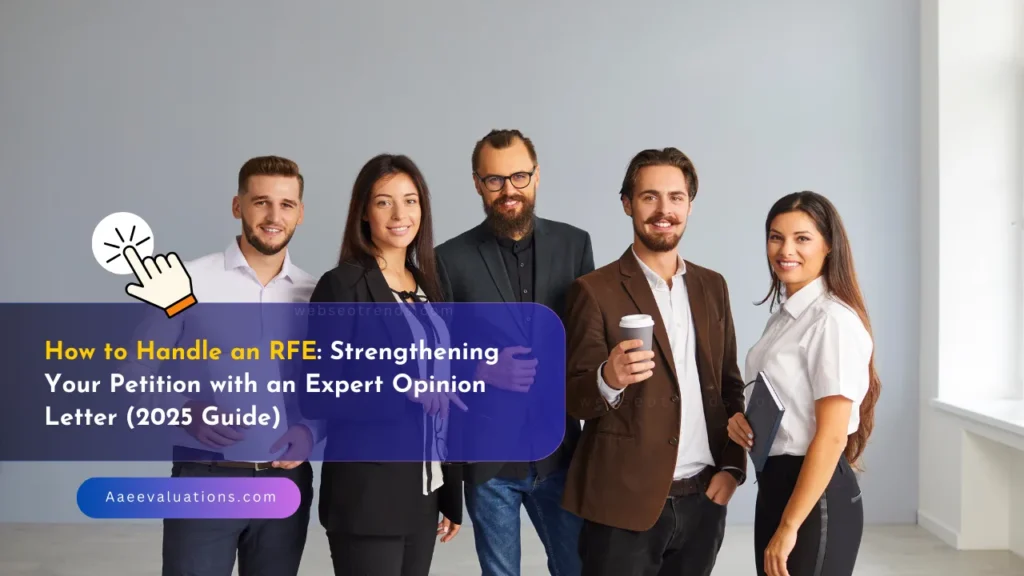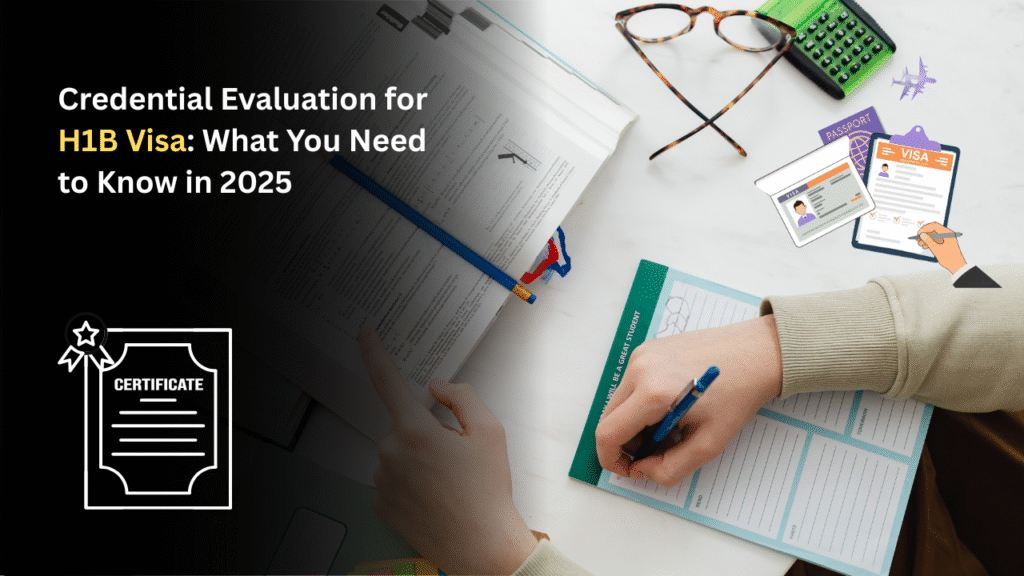How to Handle an RFE?
Dealing with U.S. immigration can be a long, detailed process, especially when you are applying under the EB-2 National Interest Waiver (NIW) category. Many applicants invest months gathering documents, drafting petitions, and ensuring every detail is accurate, only to receive a Request for Evidence (RFE) from the United States Citizenship and Immigration Services (USCIS).
While getting an RFE might feel discouraging, it is important to remember that it is not a denial. Instead, it is an opportunity to clarify your case and fill in any missing gaps. One of the most powerful ways to respond to an RFE is with a well-structured Expert Opinion Letter. This letter can directly address USCIS’s concerns, reinforce your petition, and often turn a borderline case into an approval.
This article explores everything you need to know about handling an RFE, the role of Expert Opinion Letters, how to choose the right expert, and strategies for structuring your response so you can maximize your chances of success.
Understanding the RFE (Request for Evidence)
What is an RFE?
An RFE, or Request for Evidence, is a notice sent by USCIS when the officer reviewing your petition believes additional information or clarification is needed before making a decision. Think of it as USCIS saying, “We need more proof before we can move forward.”
It doesn’t mean your application is weak overall. In many cases, the officer simply wants more documentation to confirm eligibility. RFEs are common, especially in EB-2 NIW petitions, where demonstrating the national importance and merit of your work can be subjective.
Common Reasons EB2-NIW Cases Get RFEs
USCIS often issues RFEs in NIW cases because the standards are broad and depend on interpretation.
Some of the most frequent reasons include:
- Insufficient evidence of national importance – USCIS may feel the petition didn’t adequately prove how the applicant’s work benefits the U.S. as a whole.
- Lack of independent support – If most recommendation letters come from colleagues or supervisors, USCIS may request opinions from independent experts.
- Unclear link to the Dhanasar criteria – Under the current NIW framework, applicants must show substantial merit, national importance, and that waiving the job offer/labor certification benefits the U.S.
- Weak evidence of future contributions – USCIS may want proof that your work will continue benefiting the U.S. beyond your past achievements.
- Over-reliance on self-assertions – If your petition relies heavily on your own claims without third-party validation, an RFE is likely.
Why You Shouldn’t Panic When You Get One
Receiving an RFE can feel stressful, but it’s important not to panic. Many applicants actually succeed after receiving and responding to an RFE. In fact, the RFE gives you a clear roadmap of what USCIS is questioning. Instead of guessing what might be missing, you now have specific points to address.
Handled correctly, your RFE response can strengthen your petition, showcase additional evidence, and increase your chances of approval.
The Role of Expert Opinion Letters in an RFE Response
Why USCIS Values Independent Expert Opinions
USCIS officers are not subject-matter specialists in every field. Whether your expertise is in engineering, medicine, IT, environmental science, or another discipline, they may not fully understand the impact of your work without outside validation.
This is where Expert Opinion Letters play a critical role. An independent expert, usually a professor, researcher, or professional with recognized authority, can explain:
- Why your work matters to the U.S.
- How it aligns with national interests.
- Why it has substantial merit and future potential.
Because these opinions come from independent authorities, they carry weight with USCIS and help officers see the broader significance of your contributions.
What Makes an Expert Letter Effective in an RFE Situation
Not all letters carry the same influence. An effective Expert Opinion Letter should:
- Directly respond to USCIS concerns highlighted in the RFE.
- Provide clear evidence of the applicant’s impact using data, publications, patents, or industry adoption.
- Demonstrate the independence of the expert, showing no conflict of interest.
- Clearly link the applicant’s contributions to Dhanasar criteria.
- Use objective, professional language that avoids exaggeration but strongly supports the case.
Real Examples of Letters That Made a Difference
Consider two scenarios:
- Case A: An applicant received an RFE questioning the national importance of their research in renewable energy. The response included an Expert Opinion Letter from a leading professor at a U.S. university specializing in climate change, who emphasized how the applicant’s innovations could reduce carbon emissions nationwide. The petition was approved.
- Case B: Another applicant had strong recommendation letters but all from supervisors at their company. USCIS requested independent validation. After adding an Expert Opinion Letter from a distinguished industry researcher unaffiliated with the company, the petition was approved.
These examples show how the right expert letter can bridge the exact gaps USCIS points out.
When to Consider Submitting a New or Improved Expert Letter
Signs Your Original Letter Wasn’t Strong Enough
If USCIS is still asking for clarification after you included expert letters in your initial filing, it may mean:
- The letter was too generic.
- The expert lacked strong credentials or independence.
- The letter didn’t directly tie your work to U.S. national interest.
How to Spot Gaps the RFE Is Highlighting
Carefully read the RFE and underline what USCIS is questioning. For example, if the RFE says, “Evidence provided does not sufficiently demonstrate national importance,” that’s a signal to submit a stronger expert analysis showing the broader impact of your work.
Situations Where a New Letter Can Change the Outcome
A new Expert Opinion Letter can be decisive when:
- Your initial petition leaned heavily on employer recommendations.
- USCIS questions whether your achievements are unique.
- Your original letters didn’t highlight measurable outcomes of your work.
Choosing the Right Expert for Your Response
Who Qualifies as a Credible Expert?
A credible expert is usually:
- A university professor, PhD researcher, or senior industry leader.
- Someone with independent recognition, such as publications, patents, or leadership roles.
- An individual with no personal or financial ties to you, ensuring impartiality.
Avoiding Conflict of Interest or Weak Credentials
If your expert is your supervisor, co-author, or collaborator, USCIS may view the letter as biased. Similarly, if the expert’s credentials are limited or not well-documented, the letter won’t carry much weight.
Tips for Finding Someone with Independent Authority
- Look for academics or researchers who have published widely in your field.
- Identify industry leaders with proven authority.
- Seek professional associations that may connect you with experts willing to provide independent evaluations.
How to Structure a Strong Expert Opinion Letter (Post-RFE)
Addressing USCIS’s Concerns Directly
The letter should begin by referencing the specific RFE concerns and then systematically addressing them. A strong structure includes:
- Introduction of the expert and their credentials.
- Clear statement of independence.
- Detailed explanation of the applicant’s contributions.
- Connection to national interest and Dhanasar framework.
- Strong conclusion reaffirming why the applicant’s case should be approved.
Including Evidence of Substantial Merit and National Importance
The expert should cite tangible evidence, such as:
- Peer-reviewed publications.
- Citations and adoption of your work.
- Industry impact, job creation, or public benefits.
- Alignment with U.S. priorities (e.g., energy, healthcare, technology).
Linking Your Work Clearly to the Dhanasar Criteria
Under Matter of Dhanasar, the NIW requires:
- Substantial merit and national importance.
- The applicant is well-positioned to advance the proposed endeavor.
- On balance, it benefits the U.S. to waive the labor certification.
The expert letter must weave your achievements into these three points, making the connection crystal clear.
Other Tips for Writing an Effective RFE Response
Tone and Clarity Matter
Your response should be professional, clear, and focused. Avoid unnecessary technical jargon unless explained in simple terms. Remember, USCIS officers are legal adjudicators, not specialists in your field.
Supporting Documents to Include with the Letter
Besides the Expert Opinion Letter, include:
- Updated CV or resume.
- Copies of publications, patents, or awards.
- Media coverage or recognition.
- Data showing the practical application of your work.
Should You Hire an Immigration Attorney?
While not mandatory, many applicants choose to work with an immigration attorney for their RFE response. Attorneys ensure your submission is complete, formatted properly, and strategically addresses USCIS concerns. In complex cases, this guidance can make the difference between approval and denial.
Final Checklist Before You Submit
Review for Consistency with Original Petition
Ensure that the new evidence aligns with what you already submitted. Contradictions or inconsistencies can hurt your case.
Confirm the Expert’s Credentials and Formatting
Double-check that the expert’s resume or CV is attached, and the letter is signed, dated, and on official letterhead if possible.
Timing: Don’t Miss the RFE Deadline
RFEs come with strict deadlines, typically 30 to 87 days. Missing this deadline almost always results in denial, so act quickly.
Conclusion: Turn Your RFE Into an Opportunity
A Well-Written Expert Letter Can Strengthen Your Case
Far from being a setback, an RFE can be the turning point that strengthens your case. By submitting a strong Expert Opinion Letter tailored to USCIS’s concerns, you can provide exactly the validation needed.
Many Petitions Are Approved After a Thoughtful Response
Thousands of applicants receive RFEs every year, and many of them go on to receive approvals. With careful preparation, the right expert support, and a well-structured response, your RFE can transform from a challenge into an opportunity to secure your future in the United States.
Frequently Asked Questions (FAQs)
1. Is an Expert Opinion Letter mandatory for EB-2 NIW RFEs?
No, but it is highly recommended. While not required, these letters often provide the decisive evidence USCIS needs.
2. How many Expert Opinion Letters should I include?
Most applicants include 2–4 letters. The quality of the letters matters more than the quantity.
3. Who qualifies as an expert?
University professors, researchers, industry leaders, or recognized authorities in your field.
4. Can my employer write an Expert Opinion Letter?
Employers can write recommendation letters, but expert opinion letters should ideally come from independent authorities.
5. How long should the letter be?
Typically 3–5 pages, detailed enough to explain your qualifications but concise enough for USCIS review.
6. Does USCIS verify the expert’s credentials?
Yes. USCIS may review the expert’s background, so the author should have demonstrable authority in the field.
7. Can I use the same letter for initial filing and RFE response?
It is better to tailor letters specifically to the RFE notice.



